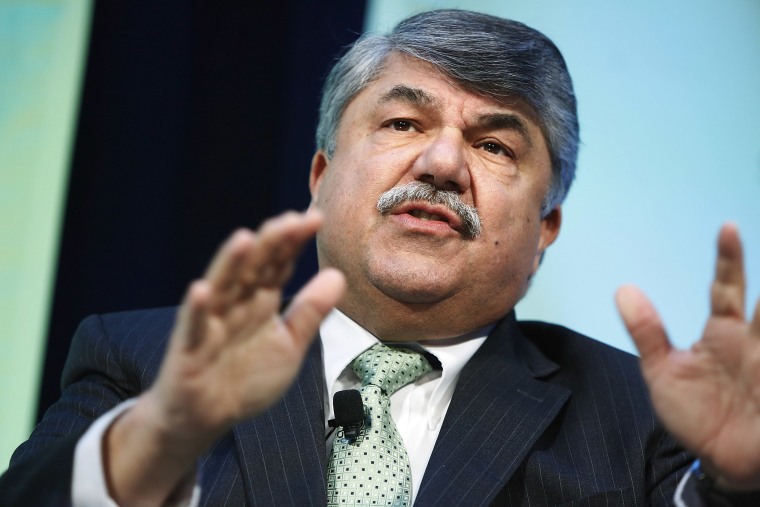The head of the country’s largest federation of unions condemned on Monday the killing of Michael Brown last month, calling it a tragedy that has ripped at the heart of the collective union family.
"Our brother killed our sister’s son and we do not have to wait for the judgment of prosecutors or courts to tell us how terrible this is."'
“Union members’ lives have been profoundly damaged in ways that cannot be fixed,” said AFL-CIO President Richard Trumka during remarks delivered at the union's Missouri chapter convention in St. Louis. “Lesley McSpadden, Michael Brown’s mother, who works in a grocery store is our sister, an AFL-CIO union member. And Darren Wilson, the officer who killed Michael Brown is a union member too, and he is our brother. Our brother killed our sister’s son and we do not have to wait for the judgment of prosecutors or courts to tell us how terrible this is.”
Trumka’s speech comes after weeks of ongoing protests and national outrage erupted over Brown’s killing by Ferguson police officer Darren Wilson on Aug. 9. Police say Wilson shot Brown as the two men fought for Wilson’s gun. Brown’s family, attorneys and a host of witnesses say Brown was shot as he attempted to run from the Wilson, and that the officer continued firing even as the unarmed teen attempted to turn around and surrender with his hands up.
For weeks after the killing, supporters of Brown and his family have marched and protested, at times clashing with police who fired rubber bullets and tear gas on overwhelmingly peaceful crowds of protesters.
The incident has also sparked renewed debate over racial profiling and race relations and the often fatal encounters between black men and law enforcement.
In his speech Monday, Trumka strayed from his typical convention oratory to weigh in on the complexities of race and racism.
“I’m going to talk about something that may be difficult and uncomfortable but I believe what I’m going to say needs to be said,” Trumka said. “I’m talking about race in America and what that means for our communities, our movement, and our nation. Because the reality is that while a young man named Michael Brown died just a short distance from us in Ferguson from gunshot wounds from a police officer, other young men of color have died and will die in similar circumstances in communities all across this country."
“It happened here,” he said, “but it could have happened and does happen anywhere in America. Because the reality is we still have racism in America.”
Trumka said Brown’s killing and its aftermath were an opportunity to continue the difficult dialogue on race and hold an open-ended conversation about the roots of discrimination.
Trumka said the racism of old -- the bloody, Jim Crow-era subjugation of blacks -- had deep roots in the St. Louis area. He referenced the 1917 race riots in nearby East St. Louis that left at least 200 blacks dead and 6,000 homeless after corporations replaced striking white factory workers with black ones.
“We as a movement have not always done our best to support our brothers and sisters of color who face challenges both on and off the job—challenges that you don’t really understand unless you live them,” he said. "The test of our movement’s commitment to our legacy is not whether we post Dr. King’s picture in our union halls; it is do we take up his fight when the going gets tough -- when the fight gets real against the evils that still exist today.”
Trumka said it’s critical that a modern labor union movement embrace the plight of black and brown workers alike.
When a new immigrant is mistreated on the job because they don’t speak the language or when a black worker doesn’t get a promotion or fair pay because of the color of their skin, “that is our fight,” he said.
He urged members to think about what it would be like to watch your kid walk out the door and “wonder with good reason if it’s the last time you’ll see him alive.”
